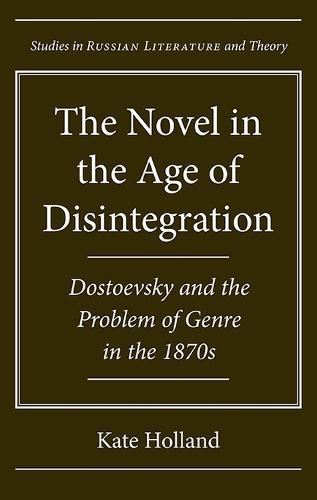Overview
Scholars have long been fascinated by the creative struggles with genre manifested throughout Dostoevsky’s career. In The Novel in the Age of Disintegration, Kate Holland brings historical context to bear, showing that Dostoevsky wanted to use the form of the novel as a means of depicting disintegration brought on by various crises in Russian society in the 1860s. This required him to reinvent the genre. At the same time he sought to infuse his novels with the capacity to inspire belief in social and spiritual reintegration, so he returned to some older conventions of a society that was already becoming outmoded. In thoughtful readings of Demons, The Adolescent, A Writer’s Diary,and The Brothers Karamazov, Holland delineates Dostoevsky’s struggle to adapt a genre to the reality of the present, with all its upheavals, while maintaining a utopian vision of Russia’s future mission.
Full Product Details
Author: Kate Holland
Publisher: Northwestern University Press
Imprint: Northwestern University Press
Dimensions:
Width: 15.70cm
, Height: 2.00cm
, Length: 23.60cm
Weight: 0.514kg
ISBN: 9780810129269
ISBN 10: 0810129264
Pages: 308
Publication Date: 31 October 2013
Audience:
Professional and scholarly
,
Professional & Vocational
Format: Hardback
Publisher's Status: Active
Availability: Available To Order

We have confirmation that this item is in stock with the supplier. It will be ordered in for you and dispatched immediately.
Reviews
Holland's treatment of tightly interconnected discourse types in Dostoevskii's literary utopias conforms to Northrop Frye's typology of genres. But rather than discussing macrostructures and their archetypal genesis, she undertakes a detailed analysis of semantic and even grammatical microstructures that characterized both Dostoevskii's own writings and the cultural jargon of the two decades that followed the publication of the Tsar's Emancipation Manifesto in 1861. --Nina Perlina in Slavic Review
Holland s book is a must for Dostoevsky scholars as well as those with a general interest in Russian life and letters at the end of the nineteenth century. Forum for Modern Language Studies
Holland s treatment of tightly interconnected discourse types in Dostoevskii s literary utopias conforms to Northrop Frye s typology of genres. But rather than discussing macrostructures and their archetypal genesis, she undertakes a detailed analysis of semantic and even grammatical microstructures that characterized both Dostoevskii s own writings and the cultural jargon of the two decades that followed the publication of the Tsar s Emancipation Manifesto in 1861. Nina Perlina in<i>Slavic Review</i>
Author Information
Kate Holland is an assistant professor in the Department of Slavic Languages and Literatures at the University of Toronto, Canada.




